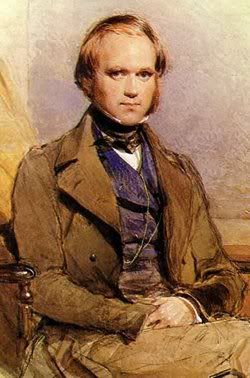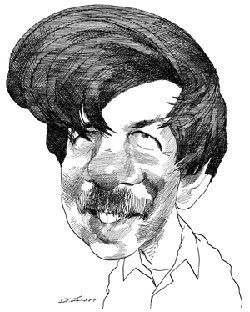
Watching Richard Dawkins on TV makes me very grumpy, therefore I try not to miss him.
Tonight saw the first episode of The Genius of Charles Darwin, a three-part series of the author of The Origin of Species. The C4 Website (linked to above) says, in its overview of the series:
According to recent polls four out of 10 British people still believe in God as the creator of the universe and everything in it. As a scientist, and Britain's best-known atheist, Dawkins believes that such people simply don’t know enough about the evidence for Darwin's entirely natural explanation of life on Earth – evolution.
And so the polemics begin - religious people, in Dawkins' view, are not merely mistaken in their beliefs: they are wrong because they are uneducated.
The programme starts with the scientist - or, more precisely, the philosopher of science - addressing a class of 15-16 year olds, all of whom appeared to have been picked from the 40% of people who according to the aforementioned polls still believe in God. Most of them still appeared to believe in God with varying degrees of doubt at the end of the programme, although one boy said that "I don't think evolution's going to be one hundred percent accepted, 'cos there's still a lot of religious people out there." However, most of them said they were coming over to the idea of evolution.
I found this strange. I learnt about evolution at a younger age than these children at a faith school
 in Glasgow, and found the idea that the world was as young as alleged in Archbishop Ussher's chronology, which placed the creation of Adam and Eve in 4004, rather strange. We studied the idea of heredity as proposed by Gregor Mendel, an Augustinian monk and contemporary of Darwin's who has been hailed as the father of genetics, and were fascinated by the concept of the Big Bang, an idea first proposed (under the name of the "Primeval Atom") by the Belgian priest Georges Lemaître, whose vocation appears not to have deterred the great astrophysicist Arthur Eddington from collaboration. (I later learnt of the important work on paleontology - ie humanity pre-4004 - done by the French Jesuit Teilhard de Chardin, whose work anticipated James Lovelock's Gaia hypothesis.)
in Glasgow, and found the idea that the world was as young as alleged in Archbishop Ussher's chronology, which placed the creation of Adam and Eve in 4004, rather strange. We studied the idea of heredity as proposed by Gregor Mendel, an Augustinian monk and contemporary of Darwin's who has been hailed as the father of genetics, and were fascinated by the concept of the Big Bang, an idea first proposed (under the name of the "Primeval Atom") by the Belgian priest Georges Lemaître, whose vocation appears not to have deterred the great astrophysicist Arthur Eddington from collaboration. (I later learnt of the important work on paleontology - ie humanity pre-4004 - done by the French Jesuit Teilhard de Chardin, whose work anticipated James Lovelock's Gaia hypothesis.)Dawkins is still fighting battles that others have walked away from a long time ago - for instance, in trying to show how evolution's bloody battlefield precludes God, he refers to antelope being ripped apart by lion in his native Kenya, and then to "feeling a parasite rasping away from within", and concludes, "there is no central authority, no safety net."
The mention of the parasite is a reference to the ichneumon wasp, one species of which finds a caterpillar to lay its eggs inside after paralysing it, meaning that the caterpillar is alive while being eaten by the little blighters. The Victorians were arrogant enough to have a crisis of conscience over this fact, which weakened many people's faith in God to no small extent. (Funnily enough, the ichneumon wasp is the first fully-worked out example in Dawkin's The Extended Phenotype). I call the Victorians arrogant in that if they'd really wanted to have a crisis of conscience, they could have done worse than look in their local workhouse, which might have weakened some of their typically rugged faith in themselves.
Dawkins, like a typical mid-Victorian, is something of a rugged individualist in that he seems to want the whole world to be able to do without God, in contemplation of whom he throws one of the most famous tantrums in recent literary history in The God Delusion:
Darwin, a former theological student, displayed more self-control when he wrote to the American botanist Asa Gray: "I cannot persuade myself that a beneficent and omnipotent God would have designedly created the Ichneumonidae with the express intention of their feeding within the living bodies of Caterpillars, or that a cat should play with mice." Even so, I feel as if I'm witnessing the playground cri de coeur of a child who first realises that the world of grown-ups is deeply unfair.The God of the Old Testament is arguably the most unpleasant character in all fiction: jealous and proud of it, a petty, unjust, unforgiving control-freak; a vindictive, bloodthirsty ethnic cleanser; a misogynistic, homophobic, racist, infanticidal, genocidal, filicidal, pestilential, megalomaniacal, sadomasochistic, capriciously malevolent bully.
Dawkins, however, is determined to appear as a great white hunter at the vanguard of humanity's battle to survive. He returns to Africa to consider humanity's fight against viruses, which he seems to identify as our latest engine of natural selection and concentrates on HIV - worryingly so, since he has only just treated the effects of Malthus' catastrophic theories on how disease and famine were essential to control overpopulation. I wonder if he would see natural selection so disinterestedly if a virus were devastating the world's top dons.
But there's the rub. Viruses like HIV are nothing to do with being at the cutting edge of humankind, or acting as a check upon overpopulation. As medical author Frank Ryan explains in his book on emerging viruses, Virus X, new viruses are directly related to the effects of human acquisitiveness (the original sin?) upon the natural habitats of said viruses:
Deforestation is therefore a dangerous practice...Take for example the consequent loss of birds. The reduction in bird numbers may mean a plague of insects. In Robert Shope's words: 'Every time you sample a new species of insect, you find new viruses'. In the Amazon, as in the African and Asian rainforests, there are more than a million species of insect alone...so the repercussions, through a myriad of poorly understood pathways, will prove continental and in some circumstances, possibly global. Whenever man intrudes...the disturbed microbes will begin to emerge.So although ideologues like Dawkins may lampoon people of faith as following the desire to "believe without question...obey the tribal elders" (The God Delsuion, chapter 5), it seems that he is inviting his target audience to accept what he is saying, without presenting an alternative view - an abuse of a programme named after a scientist who agonised over the implications of his theories for faith and the accepted truths of his time. (In the recent Church of England Synod, for example, Archbishop of Canterbury Dr Rowan Williams found that trying to get free-thinking Christians to see eye to eye was like herding cats.)
The notorious clearing of the Briazilian forest for the building of the road through Rondonia, has already resulted in between 400,000 and 800,000 additional cases of malaria. In 1989 an epidemic affecting 100 people in Venezuala was traced to the emerging Guanarito haemmorhagic fever virus which broke out in a rural community which had begun to clear the rainforest. Deforestation or intrusion into the rainforest played an important part in the emergence of Ebola and, perhaps with the hunting of primates, in the emergence of AIDS.

At the end of an essay on how nature's non-moral essence does not allow us to draw ethical conclusions about how lion hunt or the fates of caterpillars, Stephen Jay Gould quotes a sentence from Darwin's correspondence that I wonder if Dawkins will allow his class to hear in the remaining two episodes of the documentary:
"I feel most deeply that the whole subject is too profound for the human intellect. A dog might as well speculate on the mind of Newton. Let each man hope and believe what he can."
Related posts
The Genius of Charles Darwin Part 2: the altruism delusion
The Genius of Charles Darwin Part 3: return of the ichneumon delusion











No comments:
Post a Comment
Please feel free to leave a comment - Frugal Dougal.